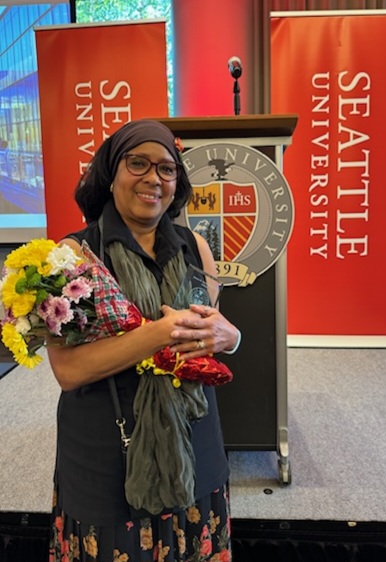Dr. Mary-Antoinette Smith, Professor of English and Women, Gender and Sexuality Studies Appointed to Theiline Pigott McCone Chair in Humanities
Written by Claire Baumgardner
Tuesday, December 10, 2024
/0x79:5472x3570/prod01/channel_34/media/seattle-university/college-of-arts-and-sciences/images/GutierrezSmith_yck_PigottGaffneyChairs_021.JPG)
Two-year appointment focuses on engaging the work of Octavia Butler
Seattle University President Eduardo Peñalver has named Dr. Mary-Antoinette Smith, Professor of English and of Women, Gender and Sexuality Studies the 2024-2026 Theiline Pigott-McCone Chair in Humanities. The theme for programming during her appointment is To Be or Not To Be Octavias?—That is the Question! and will focus on Octavia Butler’s two “Earthseed” novels—Parable of the Sower and Parable of the Talents—as primary literary texts for Year One and Year Two, respectively. Dr. Smith is the first African American woman appointed to this chair.
Over the next two years of programming, Dr. Smith plans to “foster scholarly, pedagogical, and communal engagement” with a focus on moving “from theory to praxis across the disciplines at this critical time of change to remedy and reverse a portentously devastating future” forewarned by Butler’s writings. While centered on Afrofuturistic projections, her projects and programming will bring her expertise as an Eighteenth and Nineteenth Century British Literature and Women and Gender Studies Specialist in dialogue with pressing contemporary issues.
The title of her two-year theme, To Be or Not To be Octavias? is inspired by a panel discussion coordinated by local Afrofuturist author Nisi Shawl in 2007, which prompted respondents to ponder the question of who may be able to ‘take Octavia Butler’s place’ after her death in 2006, the implications of such a question, and whether it’s even a correct one. Shawl herself responded in the form of a letter addressed to Octavia, which includes the notion that “. . . it looks like we’re all going to have to be Octavias. All of us: women, and men, and every other gender as well; African Americans, Native Americans, and every other race—all of us. At least in this sense: we’re going to have to write change-the-world fiction . . .” among other forms of activisms to improve our society and world.
In exploring and expanding upon the question of what it is to ‘be an Octavia,’ Dr. Smith’s theme for this Chair will “advance the work for the common good Butler’s legacy represents while coinciding with her timely significance.” In addition to gatherings and reading discussion groups centering Butler’s work, Dr. Smith will put out a call for papers answering or addressing the question posed by her theme, to create a collection of essays, of which Dr. Smith will be general editor.

Dr. Smith is also developing a course to correspond with her work in this Chair. “In addition to reading select Butlerean texts,” she notes in her application, “students will also engage in writing assignments in answer to the titular query as related to our institutional mission for social justice with specific reference to their individual invested intersectional interests in issues of race, ethnicity, class, gender/gender identity, sexual orientation, religion, etc., as well as sociopolitical issues related to ecofeminism, human rights, health care, poverty, inequality, climate change, and more.”
Her Chair-sponsored collaborations will bring college and campus colleagues together to engage in opportunities which invite their interdisciplinary expertise, reading/research interests, pedagogical envisionings, emergent scholarly/creative project ideas, and more to gatherings such as reading discussion groups, curricular planning sessions, and casual collegial chats. These activities will encourage production of a wide range of projects reflecting their particularized connections to and investments in the overarching theme as they relate to Octavia Butler. These conversations will culminate in annual Pigott-McCone sponsored symposiums each spring quarter.
Finally, as Dr. Smith notes, the charge upon which the Pigott-McCone Chair is founded “mirrors my career-long commitment as a productive academician poised at the intersections of race, class, gender, and sexuality at time when our institutional vision seeks to become one of the most innovative and progressive Jesuit and Catholic universities in the world across all academic and professional levels as aligned with the values of diversity, equity, inclusion, and justice.”
Written by Claire Baumgardner
Tuesday, December 10, 2024
Contact Listing
Mary-Antoinette Smith
Professor, English
Professor, Women, Gender & Sexuality Studies
/0x64:1319x1586/prod01/channel_34/media/seattle-university/directory/faculty-amp-staff-directory/images/artsci/Smith-Mary-Antoinette-Large-c4X5-mw.jpg)
/0x159:860x702/prod01/channel_34/media/seattle-university/news-amp-stories/magazine/winter-2025/Matt-Isaac_Checkerboard.png)
/0x11:2326x1480/prod01/channel_34/media/seattle-university/news-amp-stories/magazine/winter-2025/TammyHerdener_newsroom.png)
/0x11:2326x1480/prod01/channel_34/media/seattle-university/news-amp-stories/magazine/winter-2025/Randy_Merced_NewsroomStory.png)